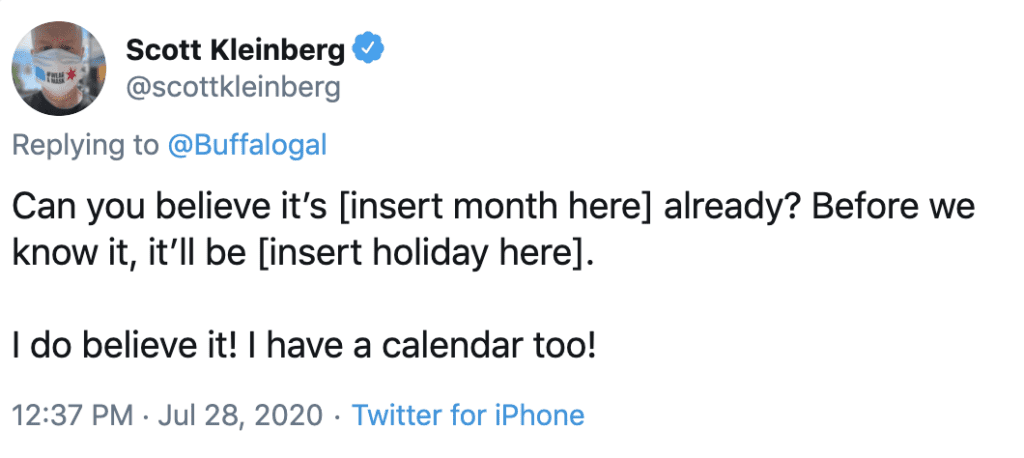
In these unprecedented times the new normal can take its toll on any communicator.
(See what we did there?)
Jargon, cliché and overused phrases litter inboxes and broadcast across our screens. With COVID-19, a new crop has come into our daily purview.
“It has been well-documented that during the pandemic, some standard phrases have come into overuse,” said Hinda Mitchell, president, Inspire PR Group. “The problem with this is—audiences are savvy. They are getting 16 emails a day that all start with some version of “Health and safety is our priority” or “In these unprecedented/uncertain/challenging times…” and it is exhausting to the reader, so he or she shuts down.”
While it may seem easy to insert “said-phrase-here,” using clichés and turnkey phrases cause a reader to gloss over information and at worst—stop reading.
Why Clichés?
PR professionals do not get to where they are without knowing how to communicate, and that includes a fundamental task—writing. So why do veteran communicators succumb?
“Writing meaningful, compelling content takes a deft touch and original thinking,” Mitchell said. “There is a lot of peer pressure currently happening in writing, i.e., 'Well, this brand issued this letter to their customers, and so we should, too.' And then they proceed to mirror that language–and the cycle begins.”
Jonathan Rick, founder of communications consultancy The Jonathan Rick Group in Washington, D.C., also teaches English at the University of Maryland. Rick said resorting to cliché has many causes.
“Great writers subtly violate their readers' expectations in order to surprise, to delight, or to emphasize a point,” Rick said. “For example, they create puns. Bad writers do the opposite: They use clichés. Among the worst offenders recently: At the end of the day, Drill down, and Take it offline.”
With busier schedules, it could be that communicators are tired, and are using phrases that come easily to them.
“Why do bad writers recycle shopworn phrases? Because figures of speech are familiar; they’re easily retrievable from within the hard drive that is the human brain. The writer doesn’t really need to think; all one needs to do is write down the first thought that surfaces.”
The Worst Offenders
To become a better writer and communicator it’s important to review and acknowledge what words are floating around. We crowdsourced phrases and words reporters and communicators tire of seeing in articles and press releases—many reflecting COVID-19-related messaging. Try to avoid these or create new phrases where you can.
Unprecedented times/uncertain times/difficult times/new normal
After several months of this, we’ve gotten used to these unprecedented times, and the new normal is no longer new.
Thrilled
When I was at Variety back in the Pleistocene my editor led a one-man crusade against all press release quotes containing the word “thrilled” https://t.co/iDBD7T1ijF
— 💭 (@samthielman) July 28, 2020
Thought leaders
Shouldn’t a leader always be thinking? Why are some thoughts ranked higher than others? Many questions here.
Thoughts and prayers
“At face value, having your thoughts and prayers be with someone in need should be a good thing. But politicians hijacked the phrase. Applied inappropriately to social issues, it lost its purpose,” Mitchell said.
Now, more than ever...
Now. More. Than. Ever. 🙈🤦🏼♀️
— Lauren Hall (@LaurenHall) July 28, 2020
We are listening
Are you? Where? Are you spying on us through our Alexa or computer? Creepy.
Doubling down
If you are doing one thing well, why the need to double down? What does that even mean? You are not moving in a downward motion. Doing more could be just as effective.
Can you believe it’s [insert month here] already? Before we know it, it’ll be [insert holiday here].

An abundance of caution
If you are already taking caution—which is dire and serious enough—what difference does it make if there is more of it?
How to Improve
Thankfully we live in a time of many outlets for improvement, including skilled communicators and writing coaches who can provide simple tips to help your writing (ours included).
Ann Handley, chief content officer at MarketingProfs, renowned for her commitment to stronger writing, provided PRNEWS with guidelines to consider after crafting a piece.
Avoid buzzwords/jargon where you can.
“Remember that buzzwords/jargon are not the words of business, as you might've thought,” Handley said. “They are, instead, the words of lazy communicators.”
“Not all jargon is bad,” Handley said. “Jargon is like cholesterol: there's a good kind and a bad kind. The good kind is the shorthand of many industries that signals how you speak the language of your customers. The bad kind is often used when the speaker isn’t creative or smart enough to find better words.”
Keep it simple.
“Simple and straightforward bests complex and long-winded. "Use" not "utilize."”
Avoid words with additives like "-ize" or "-ism" or "-istic" when possible.
“Like food additives, they make the result less nourishing and contribute to content obesity: Words become fat, bloated versions of themselves.”
Avoid "weblish."
“Tech words applied to people.”
Use your voice.
“Read your copy or content out loud. Does it sound like you?”
Rick provided this anecdote from investor Warren Buffet on how to create successful content. The technique is known as “writing for an audience of one.”
“Second to his investing brilliance, the Oracle of Omaha is known for his deep respect for clear communication,” Rick said. “His shareholder letters are so well-written that they’re considered the gold standard.
Buffet’s secret: He writes with his sisters in mind. He explains: “Though highly intelligent, they are not experts in accounting or finance. They will understand plain English, but jargon may puzzle them.”
When Buffet sees a passage that will confuse his sisters, he knows he still has work to do.
Nicole Schuman is a reporter for PRNEWS. Follow her @buffalogal
